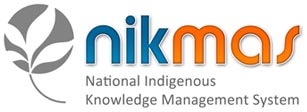About NIKMAS
The National Indigenous Knowledge Registration System (NIKRS) initiative is developed in
phases with the first phase focusing on African Traditional Medicine
(ATM) and Traditional Food for implementation because these two
themes are most at risk in terms of Intellectual Property
exploitation and bio-piracy. Mitigating this risk required careful
design of the system, particularly in terms of security and the
management of the data. Care was taken to design the National IKS
Management System (NIKMAS) such that it will support, on a national
scale, the recordal, management and protection of Indigenous
Knowledge (IK) with potential
benefits, especially in the absence of relevant legislation (i.e.
Sui Generis on IKS). The importance of securing confidential and secret information
against unauthorised exploitation was also a major design
consideration. In support of the National Recordal System, NIKMAS
comprises a semantic digital repository with custom-developed
metadata, schemata and a sophisticated security model to protect and
preserve Indigenous Knowledge (IK), an advanced semantic search engine, a cataloguing and an overarching integration
system,
architecture that combines
the subsystems into a coherent, fit-for-purpose system.
NIKMAS, as the information technology management engine of the
IK Registration is connected to IKS Documentation Centres and have been
developed as an implementing platform to support communities to
record and update information about their knowledge at the IKS
Documentation Centres (IKSDC). One of the main drivers of the IK policy
relates to the development of services provided by Indigenous Knowledge holders (IK holders) and
practitioners, with a particular focus on IK with
a scientific base. In order to support this driver, NIKMAS strives to provide
technology support to IK holders and practitioners that will allow
them to protect their IK and to benefit from value-bearing services
and products that are created using their IK.
NIKMAS will therefore provide a single access point to IK
captured at distributed points in the NIKRS initiative and will
contain links to other resources and databases containing relevant
IK information managed in various institutions or government
departments.

